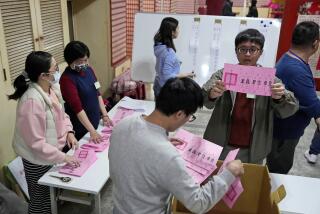China Clamps Down on Web News Discussion
- Share via
BEIJING — China this week launched a major crackdown on one of the most vibrant parts of the Internet, the news discussion groups that have pushed the boundary of free speech in the country and forced greater government accountability.
The new rules ban independent reporting that hasn’t been approved by the government, discussion of sensitive issues such as economic failures, and Web postings that challenge the Communist Party.
Officials at the Information Office of the State Council, which regulates online media, were not immediately available for comment.
But according to documents made available to The Times, Information Office gatekeepers outlined the strict guidelines to senior managers from China’s largest Internet portals in a meeting this week.
“The reason why they did this is very obvious,” said Li Fang, chief editor of Netease Review. “The Communist Party thinks the Internet news comments are putting them under too much pressure from public opinion.”
Although the government has gone after individual columns and news discussion sites in the past, insiders say this is the first time it has adopted such a systematic approach to the genre.
People who work in this area said they were afraid of getting fired, or persecuted politically, as a result of the new campaign.
The action comes as Beijing prepares to host the annual National People’s Congress meeting next week. China tends to tighten control over the media in advance of major meetings, party congresses and leadership changes.
Internet employees say this year’s meeting is not particularly important, however, and suspect that the real reason lies elsewhere. They believe that senior party officials have been rattled by the medium’s ability to shape public opinion and air citizen outrage, citing the recent “BMW case.”
In December, a court in remote Heilongjiang province handed down a suspended sentence to a woman for what many saw as murder. A farmer and his wife reportedly scratched the woman’s BMW with their cart, at which point the woman got out, yelled at a group of peasants, then got back behind the wheel and plowed into the crowd, killing a woman and injuring 12 other people. There were reports that the driver was politically well-connected.
The light sentence -- in a country where justice is often harsh -- generated a furor so intense that some Internet news discussion sites reportedly received more than 50,000 postings in a single day. The provincial governor was prompted to publicly deny that he was related to the woman. Apologies from other officials and promises to investigate the case followed.
With the government in danger of losing face, insiders say, censors on Jan. 6 issued orders to news discussion group websites to remove all coverage of the issue from their home pages. That was followed on Jan. 15 by orders to delete all past postings or any mention of the case.
“The BMW case has created instability, disturbed people’s thoughts and damaged the image of the Internet,” officials reportedly said. “The Web must know its responsibility and avoid creating conflict between the people and the government.”
The new guidelines go even further.
Online news editors were reportedly told that they could run only news already vetted in major state-controlled newspapers above the provincial level. Nor are postings by ordinary Internet users permitted without prior approval.
In some cases, the rules already were on the books but not enforced.
Visits to major Internet news discussion group sites Sina.com, Sohu.com and Netease.com on Wednesday found ample evidence of the change. Attempts to enter a news discussion group on Sina were blocked by a message saying the page was unavailable.
Most of the Netease Review’s online postings had been removed, replaced by a notice warning: “You have not registered. If you want to say anything, you must use your real name, your real ID and your real telephone number.”
Sohu appeared to be the hardest hit. Efforts to click onto its “Starsky Forum” were met with a warning that viewers were being redirected to a new site, “Starsky Humanity Forum,” requiring them to re-register.
Links to popular social commentators were greeted by the message: “This page cannot be found.”
Another part of the site warned, “This website now has a pre-checking system. Your published messages will have to be checked by management personnel before being seen by other viewers.”
One woman’s website quickly emerged as a place to vent. “I beg you guys, please respect our opinions before doing this,” wailed a user, Maomimi.
“I’m badly shaken,” said another user, with the sign-on Cherry Blossom.
Market leaders Sina, Sohu and Netease have enjoyed enormous success with the news discussion group format. They bring together well-known experts and online personalities who write columns about timely social and political issues, accompanied by analyses of news events and viewer postings.
The mix has been a hit with young, well-educated people hungry for a more substantive news diet than the state-controlled media or the fluffy lifestyle media can provide. These groups have focused attention on several areas the government would rather not highlight.
The issues they have explored, which have often prompted changes or reversals in official policy, include a series of coal mine disasters, the SARS epidemic cover-up, the treatment of migrant workers in government detention, the case of a Japanese businessman soliciting prostitutes in Zhuhai and bureaucratic corruption.
The stepped-up enforcement has not affected online sports, entertainment or lifestyle discussion groups, nor postings that support government policy.
More to Read
Sign up for Essential California
The most important California stories and recommendations in your inbox every morning.
You may occasionally receive promotional content from the Los Angeles Times.










